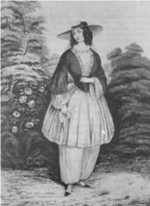Lewis Douglass to Amelia Loguen, Rochester, 6 June 1861, Walter O. Evans Collection (private)
Lewis, Frederick Douglass's oldest son, was not yet twenty-one when he wrote this, working for his father as. Amelia Loguen was one of the daughters of Jermain Loguen and Caroline Storum Loguen of Syracuse. A Rite-Aid now sits on the site of their home at the corner of Genesee and Pine.
Clearly, Amelia had entranced Lewis's younger brother, Frederick, Jr., who was a mere fifteen in 1857. Poor Lewis was an elderly seventeen at the time, with many more responsibilities in his father's office.
When Lewis saw her the second time he and his father were in Syracuse for a celebration of the Jerry Rescue, which had taken place when he was eleven.
In June 1858, the elder Douglass spoke at New York Central College. Frederick Douglass' Paper had been advertising the school, which billed itself as teaching "Radical Anti-Slavery and the Equality of the Sexes." She may have been visiting Rochester because father Douglass had no speaking engagements in Syracuse that month, and Syracuse was not in their path from Rochester to McGrawville. Clearly, Lewis was not a fan of the Bloomer dress, which was on its way out of fashion at the time. That Amelia, a black woman, wore a dress so reviled in polite society suggests her commitment to that area of reform.
My Dear Amelia,
Your letter bearing date May 29, but unfortunately for me, not mailed until the 31st reached me last evening, finding me well. Ever since you apprised me that it was not your intention to poke fun at me by that Kiss I have ceased to fancy that you so intended. If by that Kiss you intended to ameliorate my feelings towards you, let me apprise you that you have triumphantly succeeded in your Amelia – rating. Just at the present moment I would be glad to receive another Amelia ration, as I shall hereafter call your love inspiring kiss, they now are rations which I will always be glad to receive. That cold “good evening” when we met at our house the time of your visit on returning from the falls, I am excusable for though I had seen you on four occasions before I never had an introduction to you. The time you were at our home in 1857 I did not even speak to you, in fact I was completely thrown into the shade by a younger brother who I remember staid away from the office for the purpose of entertaining you, you will no doubt remember the circumstance. The next time I saw you was the 2nd of Oct. 1857 at 6 ½ o’clock p.m. at your home, then I did not speak to you, and the next time I saw you was in June 1858, father and myself were on our way to McGrawville, then I had no introduction to you and nothing but a “cold good afternoon” escaped either of us, it was on that occasion, that you were dressed in that near approach to masculine unmentionables, bloomers, and sang ‘I’ll never see my darling any [nivey?],’ you will also remember this occasion, again, the next time we met was in Geneva, August 1, 1859, then I had no introduction to you but I believe we exchanged nods as we were walking down to the park, this time you will remember as you were waited upon by a highly interesting (to say the least) ‘dark’ from Syracuse I believe, on the discovery of which I ‘sloped,’ leaving you and Miss Douglass in the enjoy
[letter incomplete]
Lewis, Frederick Douglass's oldest son, was not yet twenty-one when he wrote this, working for his father as. Amelia Loguen was one of the daughters of Jermain Loguen and Caroline Storum Loguen of Syracuse. A Rite-Aid now sits on the site of their home at the corner of Genesee and Pine.
Clearly, Amelia had entranced Lewis's younger brother, Frederick, Jr., who was a mere fifteen in 1857. Poor Lewis was an elderly seventeen at the time, with many more responsibilities in his father's office.
When Lewis saw her the second time he and his father were in Syracuse for a celebration of the Jerry Rescue, which had taken place when he was eleven.
In June 1858, the elder Douglass spoke at New York Central College. Frederick Douglass' Paper had been advertising the school, which billed itself as teaching "Radical Anti-Slavery and the Equality of the Sexes." She may have been visiting Rochester because father Douglass had no speaking engagements in Syracuse that month, and Syracuse was not in their path from Rochester to McGrawville. Clearly, Lewis was not a fan of the Bloomer dress, which was on its way out of fashion at the time. That Amelia, a black woman, wore a dress so reviled in polite society suggests her commitment to that area of reform.
Their Geneva meeting took place at a West Indian Emancipation Day celebration. The "dark," which was probably an insult, seems to have been a young man interested in Amelia, who appeared to have been accompanied by Rosetta, Lewis's sister.
Unfortunately, the rest of this letter was missing. I would like to know how these early, distant exchanges became the flirtation in which she "poked fun" of him with kisses.





thank you.Very human.....
ReplyDelete